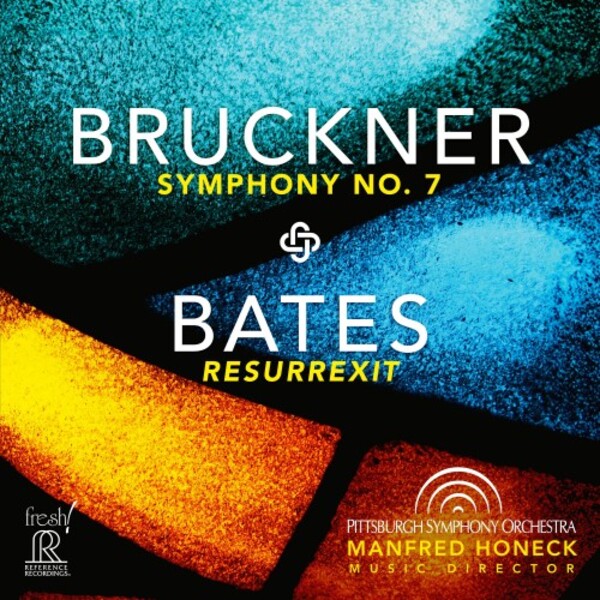BRUCKNER Symphony No 7 BATES Resurrexit
View record and artist detailsRecord and Artist Details
Genre:
Orchestral
Label: Reference Recordings
Magazine Review Date: 09/2024
Media Format: Super Audio CD
Media Runtime: 78
Mastering:
DDD
Catalogue Number: FR757

Tracks:
| Composition | Artist Credit |
|---|---|
| Symphony No. 7 |
Anton Bruckner, Composer
Manfred Honeck, Conductor Pittsburgh Symphony Orchestra |
| Resurrexit |
Mason Bates, Composer
Manfred Honeck, Conductor Pittsburgh Symphony Orchestra |
Author: Richard Osborne
‘I find it impossible to separate Bruckner from his deep spiritual beliefs’, writes Manfred Honeck in his notes for this recording of the Seventh Symphony. Little wonder, then, that it’s a deeply felt account of the great Adagio that sits at the heart of the performance, or that Honeck is moved to highlight an episode in the first movement that points us in the direction of the 22 bar meditation (fig W, bar 391, ‘very solemn’) that immediately precedes the coda. To the analyst, it may be simply a development of the two-bar motif we first hear in bar 12. For Honeck, in his booklet essay, it’s an act of transformation similar to – and possibly inspired by – the moment of Consecration in the Catholic Mass.
This most beautiful of opening movements is very much a law unto itself, creating private pathways through competing tonalities. In a structure that takes little notice of conventional sonata form, the thematically rich opening paragraph has an unbroken span of 164 bars, after which there are 246 bars of absorbed exploration before we reach the coda.
It’s also a movement that sounds as well in a performance that takes six minutes to traverse those 164 bars (Horenstein in Berlin in 1929) or eight and a half (Celibidache in Munich in 1994). Honeck takes 7'42", the same as Bruno Walter in Los Angeles in 1961 or Karajan in his gloriously long-drawn 1971 EMI recording (1/72).
What mystified me about the Honeck is why this 164-bar exposition seemed so episodic. In the end, I put it down to the pianissimo string tremolos and occasional phrase ends being played without sufficient volume or ‘carry’. In the context of so broad a tempo, they can all too easily end up generating what sound like commas or mini pauses.
Honeck, like Carlo Maria Giulini, began his career as a viola player, which explains why both conduct a Seventh whose defining string sound comes, as it should, from the second violins, violas and cellos. The Pittsburgh players, antiphonally spaced, are superb. And that’s not the only fine playing. I think of the high-lying first violins and a solo flute near the Adagio’s end, as numinously charged as TS Eliot’s ‘dove descending’.
What we don’t have here is that top-to-bottom heavyweight woodwind, brass and string sonority that’s the mark of the great Austro-German Bruckner orchestras – a sonority that helps create the kind of recorded sound we have on Herbert Blomstedt’s famous 1980 Dresden Lukaskirche version (now on MDG) or the Munich Celibidache (Warner). It also explains why Mason Bates’s Resurrexit might appear to be better recorded than the Bruckner. It isn’t, but its exotic sound palette is perhaps more congenial to the orchestra. And, at 11 minutes, Resurrexit can be played without any cross-editing. The disc derives from three live performances, which might be why a well-judged account of Bruckner’s finale has an underpowered final nine bars that seem out of kilter with what’s gone before.
Resurrexit, an orchestral meditation on the Easter story painted in Middle Eastern colours, was commissioned for Honeck’s 60th birthday in 2018. Aside from the use of a Semantron, a large wooden plank used by Byzantine monks as a call to prayer, the language is not far removed from that of, say, Stravinsky’s Firebird. But why not? It does the trick. The orchestra play the piece superbly, as I imagine only they can.
Discover the world's largest classical music catalogue with Presto Music.

Gramophone Digital Club
- Digital Edition
- Digital Archive
- Reviews Database
- Full website access
From £8.75 / month
Subscribe
Gramophone Full Club
- Print Edition
- Digital Edition
- Digital Archive
- Reviews Database
- Full website access
From £11.00 / month
Subscribe
If you are a library, university or other organisation that would be interested in an institutional subscription to Gramophone please click here for further information.




